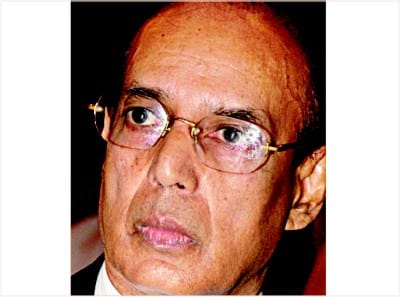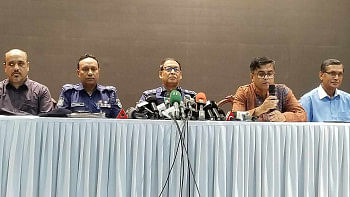Justice Hasan lost interest

Justice KM Hasan
With electoral talks between AL and BNP limping, former chief justice KM Hasan had told the US ambassador that he would “seriously consider” declining to head the caretaker government if a constitutional alternative could be found.
A US embassy cable leaked on August 30 by whistleblower website WikiLeaks revealed this.
Politics took a violent turn centring Justice Hasan's possible takeover as the chief adviser of the next caretaker government with AL and its allies labelling him biased to BNP. After the then government had raised the retirement age of Supreme Court judges from 65 to 67, Hasan became the first option to head the CG as the last retired chief justice.
On October 22, 2006, the then US ambassador Patricia A Butenis met Justice Hasan, who was supposed to be sworn in as the chief adviser of the caretaker government at the end of the BNP-led government's tenure in the same month, at his request.
“Hasan feared declining to serve as the chief adviser could create an even larger crisis without resolving the alternative,” Butenis wrote.
The leaked cable sent to Washington on October 23 said the US ambassador noted that Justice Hasan's appointment had become personal for Sheikh Hasina who was unlikely to yield on this issue.
The cable said the Australian and the Canadian high commissioners told the US ambassador that they met Justice Hasan separately at his invitation, reviewed the challenges facing him and advised him to do what he thought best for his country.
The two high commissioners described Hasan as ill prepared, isolated and not confident, adding that he told them he was having difficulty recruiting people to man a 10-member cabinet.
He also said he wanted to know the US views, Butenis added.
In another diplomatic cable dispatched to Washington on October 27, the US ambassador, however, wrote: “Hasan remains torn over whether to accept the appointment according to diplomats who have spoken with him.”
“He remains concerned that his refusal to serve, absent political agreement on an alternative, would cause worse political turmoil,” she wrote.
Another US embassy cable said AL indicated to the US and the UK diplomats in late September 2006 that it would agree to replace Justice Hasan with Justice Mahmudul Amin Chowdhury.
The AL-led opposition demonstrated in the streets for long refusing to accept Justice Hasan as CA of the caretaker government labelling him “biased to BNP”.
At the beginning of October, the then ruling BNP Secretary General Abdul Mannan Bhuiyan and AL General Secretary Abdul Jalil began talks to resolve the crisis centring Justice Hasan. They could not reach any agreement and the failure saw intensified street agitation and political turmoil.
In the wake of growing political violence, Justice Hasan on October 28 in a statement said he decided to stay away from performing his constitutionally mandated responsibility as the CA in the interest of the people.
After Hasan's decision, AL proposed to the president two names -- Justice Mahmudul Amin Chowdhury and Justice Hamidul Haque -- for CA in line with the constitutional alternatives to Justice Hasan.
But BNP refused to accept any of them heading the caretaker government.
Earlier during the electoral talks, BNP proposed that the then chief election commissioner MA Aziz could be another option. AL rejected the proposal as it had been demanding resignation of Aziz as the CEC.
“When Justice Hasan stepped aside, Awami League stood tall, convinced it had won a major victory through “people power” on the streets,” Butenis said in the cable.
But the political momentum swung dramatically from Awami League to Bangladesh Nationalist Party in just 24 hours as Iajuddin Ahmed appointed himself as the CA.
“BNP regained the initiative, and its confidence, by elevating Iajuddin Ahmed to chief adviser and manoeuvring the opposition AL, at least temporarily, back into the electoral process”, The US ambassador wrote.
“At the reception following Ahmed's swearing in, Khaleda Zia beamed at the ambassador: “What do you think of our choice?”

 For all latest news, follow The Daily Star's Google News channel.
For all latest news, follow The Daily Star's Google News channel. 



Comments